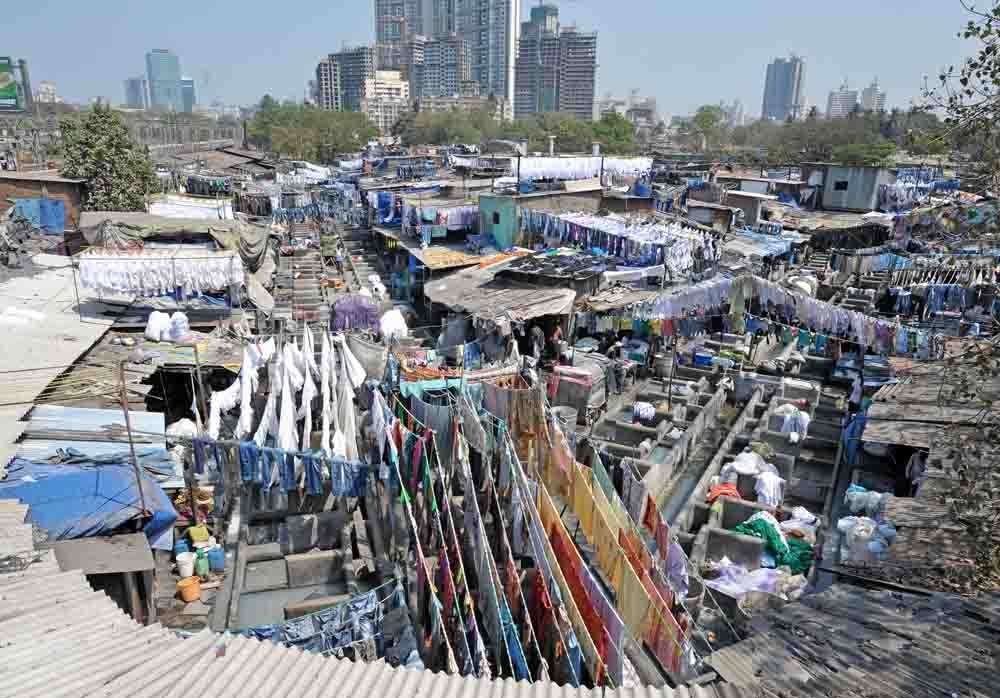It’s not often that you’d regard a washing line full of drying sheets as a tourist attraction but in Mumbai it offers a fascinating and illuminating insight into the infrastructure that makes India tick.
Notwithstanding the fact that many of the crisp white sheets you’ll curl into within your plush hotel accommodation whilst in Mumbai (or any other Indian city for that matter) are pristine, the chances are they’ve come from the ‘Dhobi -ghat’ (meaning – steps to the water’s edge for washing clothes) – a vital part of daily life in India.
Originally a manifestation of the Hindu caste system, where everyone is born to a task in life and adheres to it ‘religiously’ for the whole of their life, the Dhobi-wallah, or ‘wash-person’ from time immemorial would collect a household’s laundry and return it duly washed within a day or so.

Dhobi-ghat in the early 1900’s

In tribal areas washing is still an individual task
With burgeoning population numbers, this ‘communal laundry’ has also become environmentally beneficial as it significantly curtails water wastage, albeit it doesn’t always guarantee the ‘whitest of whites’!
During our residency in India for many years, it was regarded as socially unacceptable to do our own washing; being perceived as undermining the livelihood of the local Dhobi-wallah. Cherrie, therefore, would dutifully gather our clothing and sheets together on a regular basis and despatch them with the local Dhobi-wallah.
It didn’t take us long to recognise that many of our garments had their life severely shortened by the degree of wear they experienced in his hands and our sheets often came back to us with additional marks and nicks in them.
On further investigation, Cherrie found that the Dhobi-ghat consisted of a communal collection of concrete water tanks alongside the seasonally unpredictable river, with adjacent drying areas on its grassy banks and barbed wire fences.
Liberal helpings of bleach sought to disguise the grass stains but couldn’t obliterate the damage inflicted by the vicious spikes of wire. Cherrie took to surreptitiously washing those items we had any affection for!


In tribal and small village areas women still do their own laundry but any larger village or town will have its own Dhobi-ghat.
Whilst our own rural facility, on a plateau in central India, served a few hundred people, Mumbai’s Dhobi-ghat is on an almost industrial scale and quite mesmerising in its extent across many acres of prime city land.
Here you’ll find many of the city’s crisp white sheets that we sleep on in plush extravagance will have been laundered in vast tanks and hung out to dry under the Mumbai sunshine.
Situated at Mahalaxmi, Shanti Road, near the Mumbai racecourse and halfway between the slums of Dharavi and the swanky high-rises and hotels of Colaba, the drying clothes of Mumbai’s masses seem to stretch to the horizon.

Like the colourful tails of huge grounded kites, hundreds of washing lines weave patterns across the landscape and really bring home the scale of the problem that’s alluded to on little signs in the bathrooms of most hotel bedrooms these days; when they refer to us ‘doing our bit’ for the environment by not discarding towels and bedding unless absolutely necessary.

Freshly pressed pants
Experiences like this visit to the Dhobi-ghat lay bare and starkly visible the infrastructure and ‘behind the scenes’ operations that keep life functioning – of which many of us are so unaware. It’s like looking at an X-Ray or MRI scan, where all of the organs and intricate functions of a body become transparent and clear for all to see, whereas on a daily basis we can remain complacent and largely accepting that they will continue to function with little input from us.
Mumbai acts as an excellent ‘scanner’ for anyone interested enough to investigate the many avenues of slums, markets and artisan facilities that reveal a remarkable insight to the bare facts of life and its fascinating interweaving of totally dependent skills, trades and operations that put the little luxuries we take for granted into a much clearer perspective.
When you’re next in Mumbai, plan some time into your schedule to take a couple of excursions into the hinterland of your life, from the Dhobi-ghat to the options below in ‘Cherrie’s notes’ – you’ll be simply amazed.

If you’d like more information about the wonderful markets and mysteries of Mumbai then follow these links.
Alternatively, why not let us arrange your own tailor-made travel experiences throughout India – see below.

 Let us plan your inspiring journey through wonderful India
Let us plan your inspiring journey through wonderful India
Why not download the TLC World guide brochure or give us a call today on 01202 030443, or simply click ‘enquire’ to submit your own personal itinerary request













